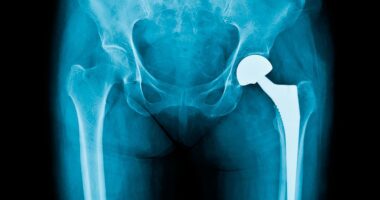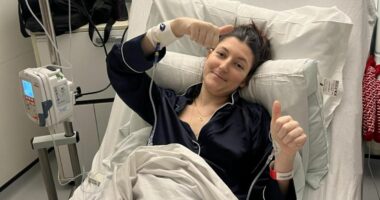Share this @internewscast.com
For the most part, heart palpitations—fast, fluttering, or pounding heartbeats—are simply part of living in a human body. But how do you know whether something is amiss, or if you just need to take some deep breaths? Ahead, cardiologists explain when it’s “normal” to feel or hear your heartbeat, what that means, and signs suggesting that you should get it checked out by a doctor.
Is it normal to feel your heartbeat…
When exercising?
As it turns out, hearing your heart when you hit the gym isn’t only common, but expected (phew!)—especially if you notice it during the peak of your workout, according to Anjali Dutta, MD, cardiologist with Morristown Medical Center in New Jersey. She explains your heart rate normally increases when you’re exercising hard: Your muscles need more oxygen, which means your heart will beat faster to pump your blood through your veins to deliver it. The result? You’re more likely to notice a certain amount of pounding in your chest.
However, if other symptoms pop up—chest pain, shortness of breath, lightheadedness, dizziness, or losing consciousness—or if you’re still feeling/hearing your heartbeat after you’ve finished working out, Dr. Dutta recommends talking to your doctor.
While lying down or resting?
If you’ve ever crawled into bed and started to feel your heart racing, know that this isn’t necessarily anything to worry about. “It is normal to feel/hear your heartbeat while resting if it lasts for a few seconds to minutes,” Dr. Dutta says. “There are no major concerns to your health if this happens.”
A variety of causes could be behind this, she continues, including stress, anxiety, dehydration, increased caffeine intake, abnormal thyroid levels, and anemia.
Sam Setareh, MD, the director of cardiology at Beverly Hills Cardiovascular, also points to your sleeping position. “Sleeping with a bent or curled posture on one’s side can elevate internal pressure, leading to palpitations,” he explains. (Even if that is the most comfortable position!)
But when to see a doctor? Dr. Dutta says if you notice this happening multiple times a day, multiple days in a row, or for longer than a few minutes, head over to your patient portal to make an appointment.
Read Related Also: Why Can’t I Stop Biting My Lip All the Time? A Psychiatry Professor Explains the Common Tendency
In other parts of your body?
Noticing or feeling your heartbeat is jarring enough. But what if you feel it in unexpected places, like your stomach or ear? “Symptoms can occur in either of these locations,” Dr. Dutta says, noting she has no major concerns.
She does mention, however, that people are more likely to notice arrhythmias (an irregular heartbeat) in the chest or ear.
But the good news is that most of the time, this isn’t the case, as long as you’re not frequently feeling your heart beat too quickly, too slowly, or with an irregular rhythm. According to Dr. Dutta, arrhythmias may be more likely if your symptoms occur often. If that’s the case, she says, your doctor can talk to you about further testing and treatment.
What causes heart palpitations and arrhythmias?
There are a number of things that can cause your heart to pound in your chest (or stomach or ears) disconcertingly. Dr. Setareh lists sleep apnea, anxiety or stress, depression, dehydration, electrolyte imbalances, diet pills, nasal decongestants with pseudoephedrine, nicotine, alcohol, caffeine, and more as possible reasons.
On the note of electrolytes, try to make sure you’re hitting those micronutrients. “The most common electrolyte imbalances which could lead to palpitations and arrhythmias are those related to magnesium and potassium,” Dr. Setareh adds. Some magnesium-rich snacks include trail mix, avocado toast, and dark chocolate. To get enough potassium, don’t forget about bananas, edamame, and sweet potatoes.
What if you *always* hear your heart?
Not everyone gets a break from hearing their heart beat. “If an individual hears their heartbeat without exertion, this might be a sign of pulsatile tinnitus,” Dr. Setareh says. “Pulsatile tinnitus is a rare form of tinnitus that causes people to hear their pulse in their ear.” The sound can be loud or soft, he says, and will happen in time with your heartbeat.
“Pulsatile tinnitus could be due to various reasons; most of them are fairly benign, others potentially dangerous,” he continues. In which case, the best bet is—you guessed it—to check with your doctor.










